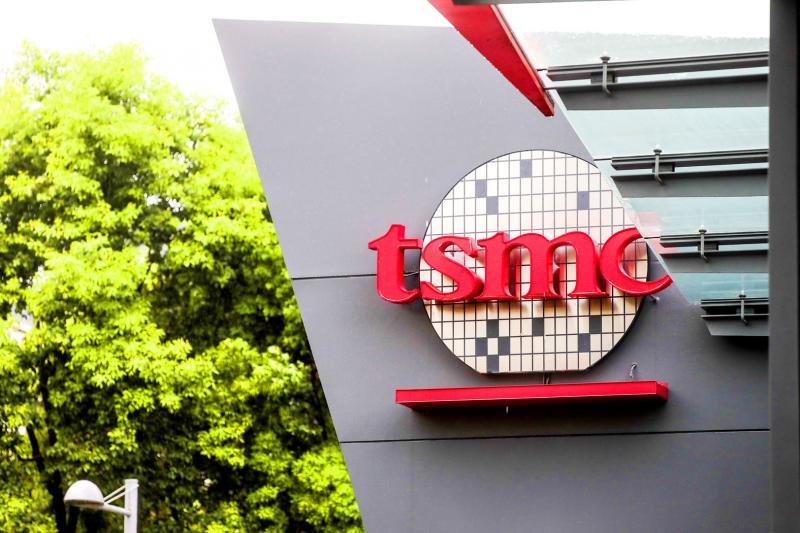City officials in Phoenix, Arizona, on Wednesday approved a slate of financial incentives and government support for Taiwan Semiconductor Manufacturing Co’s (TSMC, 台積電) planned US$12 billion chip plant, a step toward bringing high-tech manufacturing to the US and addressing national security concerns over the industry supply chain.
The city agreed to provide about US$200 million to develop roads, sewers and other infrastructure, according to a notice from the city council.
At least one additional set of traffic lights would be included for a cost of approximately US$500,000.

Photo: Cheng I-hwa / Bloomberg
The company is conducting due diligence on several locations in Phoenix with a final decision to be made later.
The decision to locate a plant in Arizona came after US President Donald Trump’s administration warned about the threat inherent in having much of the world’s electronics made outside of the US.
TSMC, the primary chipmaker for firms such as Apple Inc, had negotiated a deal with the administration to create US jobs and produce sensitive components domestically for national security reasons.
The Phoenix project is projected to create about 1,900 new jobs over five years, the company said.
“We appreciate the continuous bipartisan support from the US federal, state and city governments,” a spokeswoman for the company said. “It gives TSMC and its supply chain partners the confidence this and other future investments will be successful.”
TSMC in May said that the facility would utilize its 5-nanometer technology for 12-inch wafer fabrication and have a capacity of 20,000 semiconductor wafers per month, with construction of the plant scheduled to start next year and production to begin in 2024.
The company has said that it hoped to convince its own suppliers to set up operations in the vicinity of its new fabrication facility.
Chip giants Intel Corp and Micron Technology Inc already operate facilities in Arizona, and have helped build a vibrant local semiconductor industry over the years.
TSMC said that subsidies would be critical in setting up a fab in the US, given the additional expenses.
While Phoenix has approved its infrastructure spending, TSMC is still waiting on state and federal subsidies and incentives that could surpass by far the city’s expenditures.
The company would enter a formal deal with the city after selecting a site, which is expected before the end of the year, Reuters reported.
A representative for the city council declined to comment beyond statements in public documents.
“It is remarkable that this came to fruition during a pandemic,” Phoenix Mayor Kate Gallego said in a statement. “The payoff is huge. TSMC will create 1,900 high-tech jobs and foster thousands more related jobs in the semiconductor supply chain ecosystem.”
Additional reporting by CNA

Intel Corp chief executive officer Lip-Bu Tan (陳立武) is expected to meet with Taiwanese suppliers next month in conjunction with the opening of the Computex Taipei trade show, supply chain sources said on Monday. The visit, the first for Tan to Taiwan since assuming his new post last month, would be aimed at enhancing Intel’s ties with suppliers in Taiwan as he attempts to help turn around the struggling US chipmaker, the sources said. Tan is to hold a banquet to celebrate Intel’s 40-year presence in Taiwan before Computex opens on May 20 and invite dozens of Taiwanese suppliers to exchange views

Application-specific integrated circuit designer Faraday Technology Corp (智原) yesterday said that although revenue this quarter would decline 30 percent from last quarter, it retained its full-year forecast of revenue growth of 100 percent. The company attributed the quarterly drop to a slowdown in customers’ production of chips using Faraday’s advanced packaging technology. The company is still confident about its revenue growth this year, given its strong “design-win” — or the projects it won to help customers design their chips, Faraday president Steve Wang (王國雍) told an online earnings conference. “The design-win this year is better than we expected. We believe we will win

Chizuko Kimura has become the first female sushi chef in the world to win a Michelin star, fulfilling a promise she made to her dying husband to continue his legacy. The 54-year-old Japanese chef regained the Michelin star her late husband, Shunei Kimura, won three years ago for their Sushi Shunei restaurant in Paris. For Shunei Kimura, the star was a dream come true. However, the joy was short-lived. He died from cancer just three months later in June 2022. He was 65. The following year, the restaurant in the heart of Montmartre lost its star rating. Chizuko Kimura insisted that the new star is still down

While China’s leaders use their economic and political might to fight US President Donald Trump’s trade war “to the end,” its army of social media soldiers are embarking on a more humorous campaign online. Trump’s tariff blitz has seen Washington and Beijing impose eye-watering duties on imports from the other, fanning a standoff between the economic superpowers that has sparked global recession fears and sent markets into a tailspin. Trump says his policy is a response to years of being “ripped off” by other countries and aims to bring manufacturing to the US, forcing companies to employ US workers. However, China’s online warriors